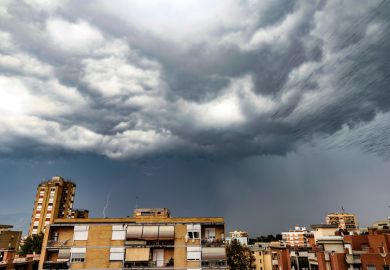The Glasgow Climate Pact has underlined the crucial role universities have to play in helping the world remain within the +1.5-degree warming threshold, which will avoid the worst effects of climate change.
Both before and during the recent COP26 conference, academics showcased the latest research and innovations, advised governments, convened international partnerships and provided expert commentary on everything from biodiversity to carbon capture to law. As co-chairs of the COP26 Universities Network, we've seen at first hand the important contribution a collaborative research-community effort can make to the success of such international deliberations.
Yet our mission has only just started. All the goals agreed at Glasgow require researchers to deliver essential technology at scale, along with tested models of fair transitions, assessments of financial needs and structured approaches to delivery. So we need to think deeply about the depth of collaboration required, perhaps seeking inspiration in the way the sector has responded to the pandemic. It is also important that universities innovate and deliver climate action on their own campuses – through education and support for students and staff, and through decarbonisation of their operations.
The UK’s COP26 Universities Network, run by academic and professional service staff from across the UK, was originally conceived more than two years ago to help support COP26 and climate action more generally.
By working together, across different areas of expertise and skill, the research community can have a greater impact and achieve more than the sum of its parts. There are a number of crucial lessons we have learned from the two years we have spent developing the network that are worth setting out.
First, we must recognise and build upon collective institutional strengths. Initially, we shared professional expertise in innovation, public outreach, engagement and communications. This collaboration increased our reach and impact, complementing the activity taking place in individual institutions. An approach that identifies our strengths and shares them across the sector leaves us all better off and will help the world meet the stark challenges COP26 has highlighted. Yet too often research institutions are forced to compete for “impact” when we should instead be working together.
Second, we found that effective collaboration requires funding. The network thrived this year on voluntary contributions from a large number of people and institutions, building on the energy that surrounded the UK’s presidency of COP26. This momentum helped the network grow and be successful. However, we were aware of the danger that heroic voluntary efforts can lead to a skewed representation of individual universities or researchers in the outputs, and there is of course a risk that fatigue will now set in. Over the past year we have been fortunate that UK Research and Innovation and a philanthropic organisation have supported some specific activities, but it is clear that initiatives central to tackling the climate change challenge must be based on long-term, sustained funding and not reliant on ad-hoc grants or volunteers.
And finally, perhaps most importantly, staff and students from across our institutions must be empowered and rewarded for contributing to this type of activity. Many network members had a drive and passion about this issue that led them to participate in our activities this year, but to continue our work, we will need to find ways to build their engagement more completely into their day-to-day tasks, so that experts can contribute to these cross-sectoral initiatives without having to do two jobs at once.
So what’s next? Well, it is time for a rebrand: now that COP26 is over, we will become the UK Climate Change Universities Network, or something similar, focussing on broadly the same issues but with increased ambition, supporting the UK and the world both to deliver on the Glasgow Climate Pact and to develop even more ambitious targets for next year’s COP27 in Egypt.
It’s often said that the higher education sector is both deeply competitive and deeply collaborative. We know, of course, that the demand for funding drives us to compete for both research and students. But as chairs of the network, we’ve seen first-hand our ability to expand impact through partnership and collective effort. It is only by building on such foundations that we can hope to succeed in our climate mission.
Emily Shuckburgh is director of Cambridge Zero at the University of Cambridge. Alyssa Gilbert is director of policy and translation at the Grantham Institute for Climate Change and the Environment at Imperial College London. They are co-chairs of the COP26 Universities Network.
Register to continue
Why register?
- Registration is free and only takes a moment
- Once registered, you can read 3 articles a month
- Sign up for our newsletter
Subscribe
Or subscribe for unlimited access to:
- Unlimited access to news, views, insights & reviews
- Digital editions
- Digital access to THE’s university and college rankings analysis
Already registered or a current subscriber?









